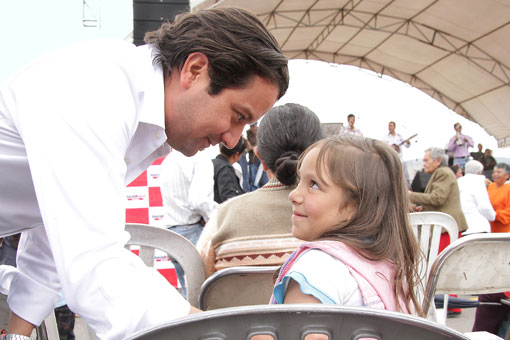At the age of three, David Luna Sánchez met then-Colombian President Alfonso López at a party convention. The President later wrote the toddler-activist a note, sparking a lifelong fascination with politics. But despite his first experience of going to the top, most of Luna’s political career has been spent working from the bottom up, in communities. It’s a strategy the 36-year-old is using as he runs for mayor of Bogotá this October.
A member of Colombia’s Partido Liberal (Liberal Party—PL), Luna considers himself “a Bogotano for life.” Aside from studying in the U.S., he has always lived in the Colombian capital.
Bogotá municipal politics are part of his DNA—his father worked for Jaime Castro when he was mayor of Bogotá—but Luna did not follow the customary route to a political career. He became a community organizer while attending law school at Universidad de Rosario, and helped members of his Chapinero neighborhood in the northwest section of Bogotá restore a polluted local stream. That led to a successful 1998 run for the town council, where he prided himself on his accessibility. (Today, he uses the same cell phone number he gave to constituents.)
Two years later, at 25, he was elected as one of the youngest members of Bogotá’s City Council. And in 2006, Luna continued his political ascendancy with a seat in the National House of Representatives.
From his first time organizing his neighbors in Chapinero, Luna has made community outreach and communication a central theme of his governing style. As federal deputy, Luna meets regularly with constituents across his district in Bogotá and was the first to run an electronic policy campaign with a website called
elcandidatoesusted.com. Every month he posts a report on his congressional website about how he voted on bills and why, so that voters and the media can judge his job performance for themselves.
It’s a style that Luna is trying to bring to his own party. Before the May 29 local elections, Luna traveled around the country with other PL candidates to emphasize the importance of their work with local communities. He also urged voters to turn out for the ballot—regardless of who they planned on voting for. As he says, “The only way to defeat clientelism is to increase the levels of electoral participation, which in the case of Bogotá barely surpass 50 percent.”
Luna says he will bring the same style and approach to the multiplying problems of Colombia’s biggest city. Whether it is addressing Bogotá’s notorious traffic, deteriorating security or the low quality of education, Luna believes that improving the city’s management is a seamless extension of getting its citizens actively engaged in local politics.
In all of these, Luna thinks businesses must also play a role. Transportation infrastructure, he says, can only be improved with significant private investment, and he promises to hold open bids for construction. At the same time, though, he fears that concerns about crime and education threaten to drive investors away.
Those concerns about crime and security have also come up repeatedly in Luna’s meetings with communities and citizens. He believes, on the one hand, that sentencing has to be stronger for repeat offenders. On the other, he also believes it’s necessary to address crime at its roots by providing Bogotá’s youth with productive opportunities. He is proposing an education reform plan that would expand the school day from five to nine hours, increase teacher salaries, and improve curricula to build students’ core competencies. For everyone but the students—who could spend up to four more hours a day in school—the proposal is popular. And if it isn’t, you can rest assured that Luna will want to hear about it—even from the students.





